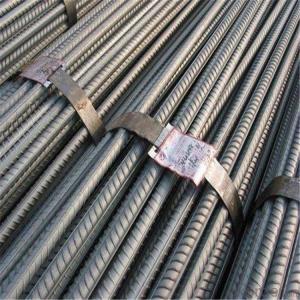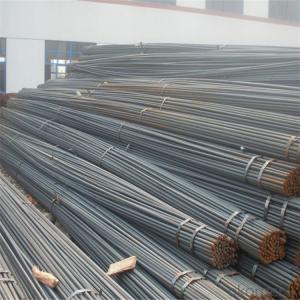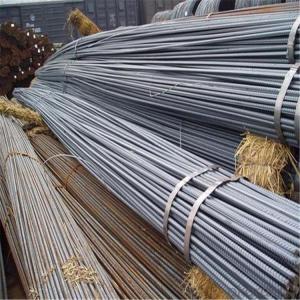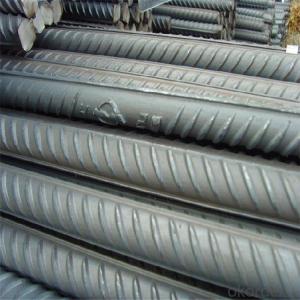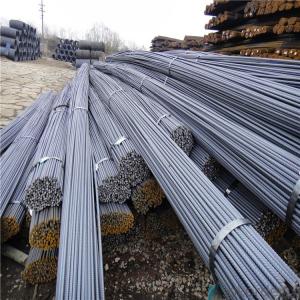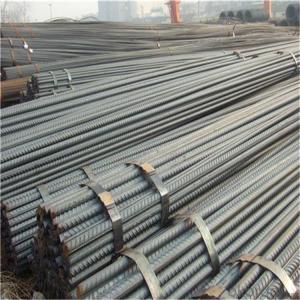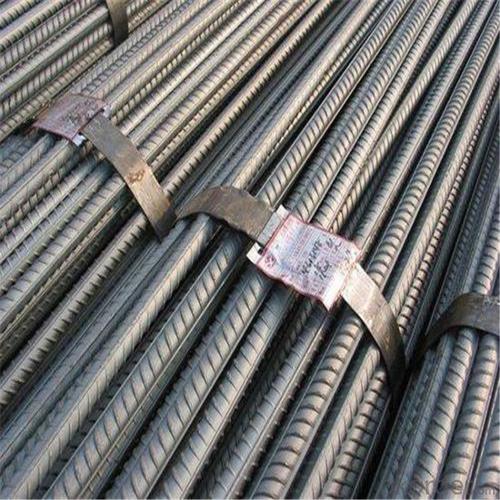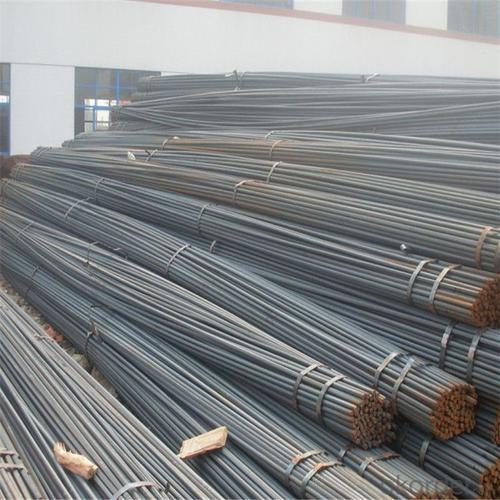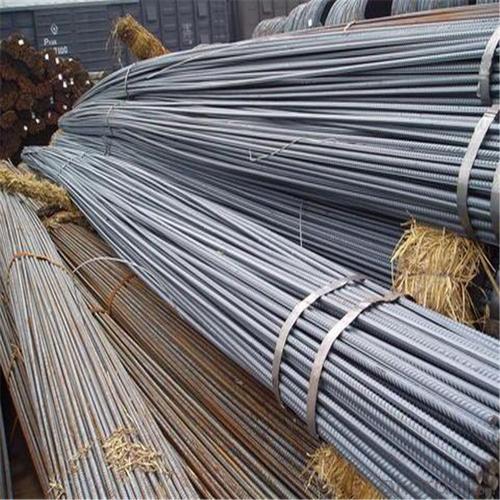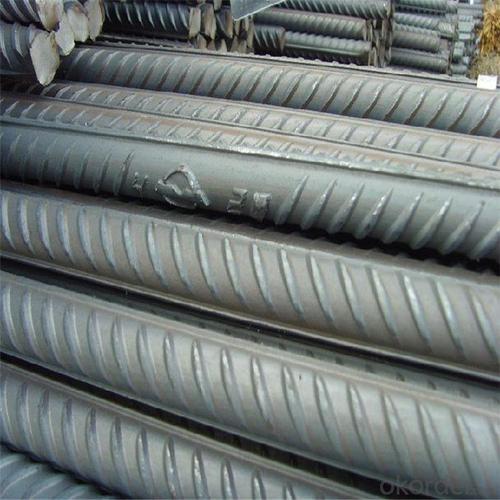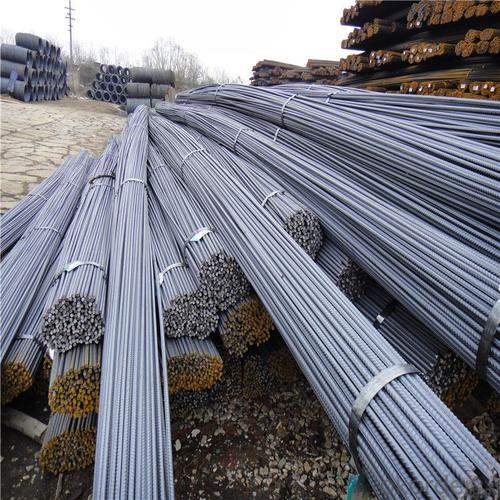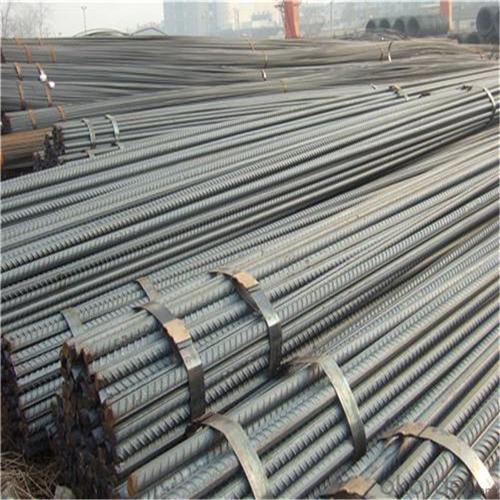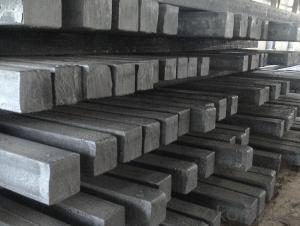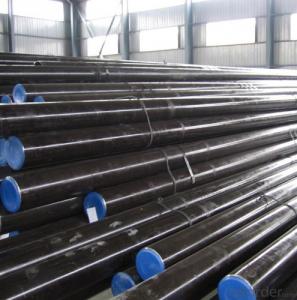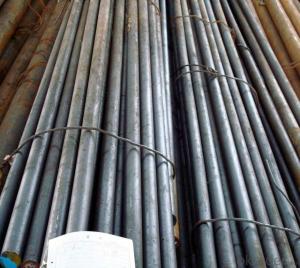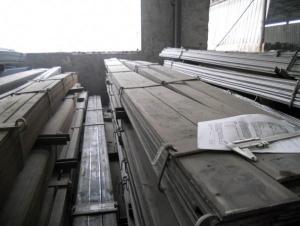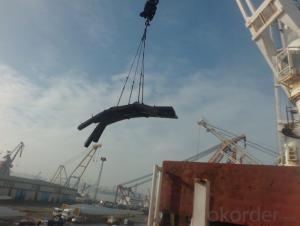Hot Rolled Rebar Screw Thread Steel Bar
- Loading Port:
- Tianjin
- Payment Terms:
- TT OR LC
- Min Order Qty:
- 100 m.t.
- Supply Capability:
- 50000 m.t./month
OKorder Service Pledge
OKorder Financial Service
You Might Also Like
Specification
Description of Thread Steel Bar
1, Diameter: 5.5mm-10mm Thread Steel Bar
10m- 40mm Thread Steel Bar
2, Length: 6m, 9m, 12m or customized
3, Standard: GB, ASTM, AISI, SAE, DIN, JIS, EN
OEM technology - send detailed technical parameters for accurate quotation.
2, Produce Process: smelt iron - EAF smelt billet - ESR smelt billet -
hot rolled or forged to get the steel round bar and plate
3, Heat Treatment: annealing, normalizing, tempering, quenching
4, Surface Treatment: Black
5, Quality Assurance: We accept third party inspection for all orders.
You can ask testing organizations such as SGS, BV, etc. to test our products before shipping.
Chemical Composition of Thread Steel Bar
Grade | Technical data of the original chemical composition(%) | |||||
Reinforcing steel bar HRB335 | C | Mn | Si | S | P | B |
≤0.25 | ≤1.60 | ≤0.80 | ≤0.045 | ≤0.045 | >0.0008 | |
Physics Capability | ||||||
Yield Strength(N/cm2) | Tensile Strength(N/cm2) | Elongation(%) | ||||
≥ 335 | ≥490 | ≥16 | ||||
Reinforcing steel bar HRB400 | C | Mn | Si | S | P | B |
≤0.25 | ≤0.16 | ≤0.80 | ≤0.045 | ≤0.045 | 0.04-0.12 | |
Physics Capability | ||||||
Yield Strength(N/cm2) | Tensile Strength(N/cm2) | Elongation(%) | ||||
≥ 400 | ≥ 570 | ≥ 14 | ||||
Products Show of Thread Steel Bar
Company Information
CNBM International Corporation is the most important trading platform of CNBM group.
Whith its advantages, CNBM International are mainly concentrate on Cement, Glass, Iron and Steel, Ceramics industries and devotes herself for supplying high qulity series of refractories as well as technical consultancies and logistics solutions.


F A Q
1, Your advantages?
professional products inquiry, products knowledge train (for agents), smooth goods delivery, excellent customer solution proposale
2, Test & Certificate?
SGS test is available, customer inspection before shipping is welcome, third party inspection is no problem
3, Factory or Trading Company?
CNBM is a trading company but we have so many protocol factories and CNBM works as a trading department of these factories. Also CNBM is the holding company of many factories.
4, Payment Terms?
30% TT as deposit and 70% before delivery.
Irrevocable L/C at sight.
5, Trading Terms?
EXW, FOB, CIF, FFR, CNF
6, After-sale Service?
CNBM provides the services and support you need for every step of our cooperation. We're the business partner you can trust.
For any problem, please kindly contact us at any your convenient time.
We'll reply you in our first priority within 24 hours.
- Q: How does special steel contribute to the oil and gas machinery industry?
- Special steel plays a crucial role in the oil and gas machinery industry by offering a range of properties and characteristics that are essential for the demanding and harsh operating conditions in this sector. Firstly, special steel is known for its exceptional strength and durability, enabling it to withstand the extreme forces and pressures involved in oil and gas extraction, transportation, and refining processes. This ensures that the machinery can operate reliably and efficiently, minimizing downtime and maintenance costs. Moreover, special steel possesses excellent corrosion resistance, which is vital in an industry where equipment is constantly exposed to corrosive environments, such as seawater, acidic gases, and high-temperature fluids. By using corrosion-resistant special steel, manufacturers can increase the lifespan of their machinery, reduce the risk of equipment failure, and enhance the overall safety of operations. Another key advantage of special steel in the oil and gas machinery industry is its high temperature resistance. Equipment used in this industry often operates at extremely high temperatures, particularly in processes like drilling, refining, and petrochemical production. Special steel alloys can withstand these elevated temperatures without losing their structural integrity, ensuring the safe and efficient functioning of the machinery. Furthermore, special steel offers excellent wear and abrasion resistance properties, making it ideal for components that are exposed to constant friction, such as valves, pumps, and drilling tools. This resistance to wear and abrasion helps to prolong the lifespan of these components, reduce maintenance requirements, and enhance the overall efficiency of the machinery. Overall, special steel contributes significantly to the oil and gas machinery industry by providing the necessary strength, durability, corrosion resistance, high temperature resistance, and wear resistance required for the demanding operating conditions in this sector. By utilizing special steel alloys, manufacturers can create robust and reliable machinery that can withstand the challenges of the oil and gas industry and help ensure the smooth and safe extraction, transportation, and processing of oil and gas resources.
- Q: How does special steel perform in chemical resistance applications?
- Special steel is renowned for its exceptional performance in applications requiring resistance to chemicals. Its unique composition and properties render it highly impervious to corrosion and damage resulting from exposure to various chemical substances. Special steel is crafted using alloys that incorporate elements such as chromium, nickel, and molybdenum, which confer outstanding resistance to acids, alkalis, and other corrosive agents. In the realm of chemical resistance applications, special steel offers multiple advantages. Firstly, it exhibits remarkable resistance to pitting corrosion, a form of localized corrosion that manifests on metal surfaces. This characteristic renders it suitable for usage in environments where chemicals may inflict harm upon the metal surface. Secondly, special steel displays excellent resistance to crevice corrosion, which arises within confined spaces or gaps between metal surfaces. This property proves particularly advantageous in chemical processing equipment, where tight joints and connections are prevalent. Moreover, special steel retains its mechanical strength and integrity even in the harshest chemical environments. It can withstand high temperatures, pressure, and exposure to aggressive chemicals without compromising its structural robustness. This renders it exceedingly reliable and durable, ensuring an extended service life and reduced maintenance costs. All in all, the extraordinary chemical resistance properties of special steel make it the preferred choice for a wide array of applications. Whether employed in chemical processing plants, pharmaceutical industries, or oil and gas refineries, special steel offers the necessary safeguard against corrosion and chemical-induced damage. Its ability to endure harsh environments while maintaining optimal performance over time renders it an ideal material for chemical resistance applications.
- Q: How is special steel made?
- Special steel is made through a process called alloying, where different elements are added to iron to enhance its properties such as strength, durability, and resistance to corrosion. This alloying process can include elements like chromium, nickel, vanadium, and manganese, among others. The exact composition and manufacturing process can vary depending on the desired characteristics and application of the special steel being produced.
- Q: What are the main factors affecting the creep rupture strength of special steel?
- The creep rupture strength of special steel is influenced by various key parameters. These factors can be categorized into several categories. Firstly, temperature plays a significant role in determining the creep rupture strength of special steel. The operating temperature affects atomic diffusion and dislocation movement, which in turn leads to accelerated deformation and eventual failure. Higher temperatures can greatly reduce the creep rupture strength of special steel. Secondly, the time duration of the applied load also affects creep rupture strength. Creep is a time-dependent phenomenon, meaning that the longer the steel is under stress, the more likely it is to experience rupture. The relationship between time and creep rupture strength is usually described by a power law equation, with longer durations resulting in lower rupture strength. The stress level is another critical factor that influences creep rupture strength. Higher levels of stress lead to faster deformation and shorter time to rupture. Therefore, it is important to ensure that the stress applied to special steel remains within an acceptable range to maintain its desired creep rupture strength. The microstructure of special steel is crucial in determining its creep rupture strength. Factors like grain size, grain boundary characteristics, and the presence of alloying elements all impact the steel's resistance to creep deformation and rupture. Fine-grained microstructures with a high density of grain boundaries tend to exhibit better creep resistance and higher rupture strength. The chemical composition of special steel also significantly affects its creep rupture strength. The addition of certain alloying elements, such as chromium, molybdenum, and vanadium, enhances the steel's high-temperature strength and resistance to creep deformation. These elements form stable carbides that hinder dislocation movement and improve the material's creep rupture strength. Furthermore, the heat treatment process used to modify the microstructure of special steel can also impact its creep rupture strength. Proper heat treatment optimizes grain size, the distribution of alloying elements, and overall microstructure, resulting in improved creep resistance and higher rupture strength. In conclusion, the creep rupture strength of special steel is influenced by temperature, time, stress level, microstructure, composition, and heat treatment. Understanding and controlling these parameters are vital in ensuring the desired performance and reliability of special steel in high-temperature and long-term applications.
- Q: Can special steel be used in the paper manufacturing industry?
- Yes, special steel can be used in the paper manufacturing industry. Special steels, such as stainless steel, can be used to make various components and equipment used in the paper manufacturing process. These steels offer excellent corrosion resistance, high strength, and durability, making them suitable for applications like paper machine parts, rollers, blades, and screens. Additionally, special steels can withstand high temperatures and mechanical stress, enhancing the overall efficiency and reliability of paper manufacturing operations.
- Q: How does special steel contribute to the aerospace racing aftermarket industry?
- Special steel plays a crucial role in the aerospace racing aftermarket industry by offering superior strength, durability, and corrosion resistance properties. It is used in the manufacturing of various aircraft components, such as engine parts, landing gear, and structural elements, ensuring high performance and safety standards. The use of special steel in this industry allows for lighter and more efficient aircraft designs, enhancing speed and fuel efficiency. Additionally, special steel's resistance to extreme temperatures and stress makes it ideal for aerospace applications, contributing to the overall reliability and longevity of aftermarket products.
- Q: How does tool steel maintain its hardness at high temperatures?
- Tool steel maintains its hardness at high temperatures primarily due to its high carbon content and the presence of other alloying elements. The carbon in tool steel forms hard and wear-resistant carbides, which help retain hardness even at elevated temperatures. Additionally, alloying elements such as chromium, tungsten, molybdenum, and vanadium contribute to the formation of secondary carbides, which further enhance the steel's resistance to softening and maintain its hardness under high heat conditions.
- Q: How is HSLA steel used in the construction industry?
- HSLA (High-Strength Low-Alloy) steel is commonly used in the construction industry due to its exceptional strength and durability. It is utilized in various applications such as building frames, bridges, pipelines, and structural components. HSLA steel's high tensile strength allows for lighter and more efficient designs, while its resistance to corrosion ensures longevity in harsh environments. Additionally, its weldability and formability make it versatile for different construction projects.
- Q: What is the tensile strength of special steel?
- The tensile strength of special steel can vary depending on its specific composition and manufacturing process. However, special steel is generally known for its high tensile strength, often exceeding 1000 MPa (mega pascals), making it suitable for applications requiring strong and durable materials.
- Q: How does special steel compare to other high-performance materials?
- Special steel is known for its exceptional strength, durability, and versatility, which sets it apart from other high-performance materials. Compared to materials like aluminum, titanium, and composites, special steel often exhibits higher tensile strength, making it suitable for applications that require robustness and load-bearing capabilities. Additionally, special steel has excellent resistance to corrosion, heat, and wear, making it ideal for use in harsh environments or high-temperature applications. One advantage of special steel over other high-performance materials is its cost-effectiveness. Compared to materials like titanium, special steel is more affordable, making it a preferred choice for various industries. Moreover, the manufacturing process of special steel allows for customization, enabling the production of a wide range of grades and compositions to suit specific requirements. Special steel also offers excellent machinability and weldability, allowing for easy fabrication and assembly. Its versatility enables it to be used in a wide range of industries, including automotive, aerospace, construction, and energy. From structural components to precision tools, special steel provides a reliable and efficient solution. However, it is important to note that the choice of material depends on the specific application and its requirements. While special steel has numerous advantages, other high-performance materials may be more suitable for certain applications, such as lightweight components or extreme temperature conditions. Therefore, a comprehensive evaluation of the specific needs and characteristics of the application is necessary before determining the most appropriate material.
Send your message to us
Hot Rolled Rebar Screw Thread Steel Bar
- Loading Port:
- Tianjin
- Payment Terms:
- TT OR LC
- Min Order Qty:
- 100 m.t.
- Supply Capability:
- 50000 m.t./month
OKorder Service Pledge
OKorder Financial Service
Similar products
Hot products
Hot Searches
Related keywords
